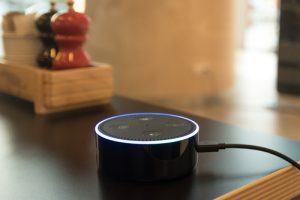
Users of Connor Zazzo’s “Tampa Green Can” program will query the voice system, which is utilized through Amazon’s Echo device, whether an item is accepted in the recycling program in Tampa, Fla. Using primarily information from the city’s website, Alexa will confirm whether a material is accepted or not.
“I ran into the problem myself that I didn’t know exactly what could and could not go in recycling or trash cans here in Tampa,” Zazzo told Resource Recycling. “So when I knew I had a project coming up, I thought I could help solve a problem that I have had myself and hopefully help out the Tampa community as well.”
Zazzo, a student at the University of Tampa, this week submitted the software to Amazon for certification and inclusion in the company’s Alexa Skills Store. A “skill” is akin to an app for Amazon Echo devices. To use the program, Tampa residents will say something like, “Alexa, ask Green Can where I can throw out some empty wine bottles,” and the Amazon Echo will respond with, “You can throw that out in your recycling bin.”
Green Can, which was first profiled in The Minaret student newspaper, will have answers for common household disposable items but can also provide information on harder-to-recycle durable goods, such as electronics, mattresses and furniture.
At least one other program with a similar goal and design has been developed for the Alexa platform. And similar software for mobile devices has been developed in the past, including Recycle Coach and iRecycle, apps that provide users with information about what and where to recycle.
Although these software programs all aim to increase recycling participation, industry experts note the importance of providing the right answers locally to avoid increasing contamination.
“If done right, and coordinated with a local program accurately, this could be a valuable resource for folks,” said Jason Hale, vice president of communications for The Recycling Partnership. “Ease of use equates to more tons recovered, and this kind of smart innovation needs to be part of our industry’s future.”
If the Green Can program proves a success locally, Zazzo said he’d like to expand it outside of Tampa.
“I think it would be great if anyone that has a real interest with going green and recycling their waste had access to a resource that can help make that challenge a little bit easier,” Zazzo said.